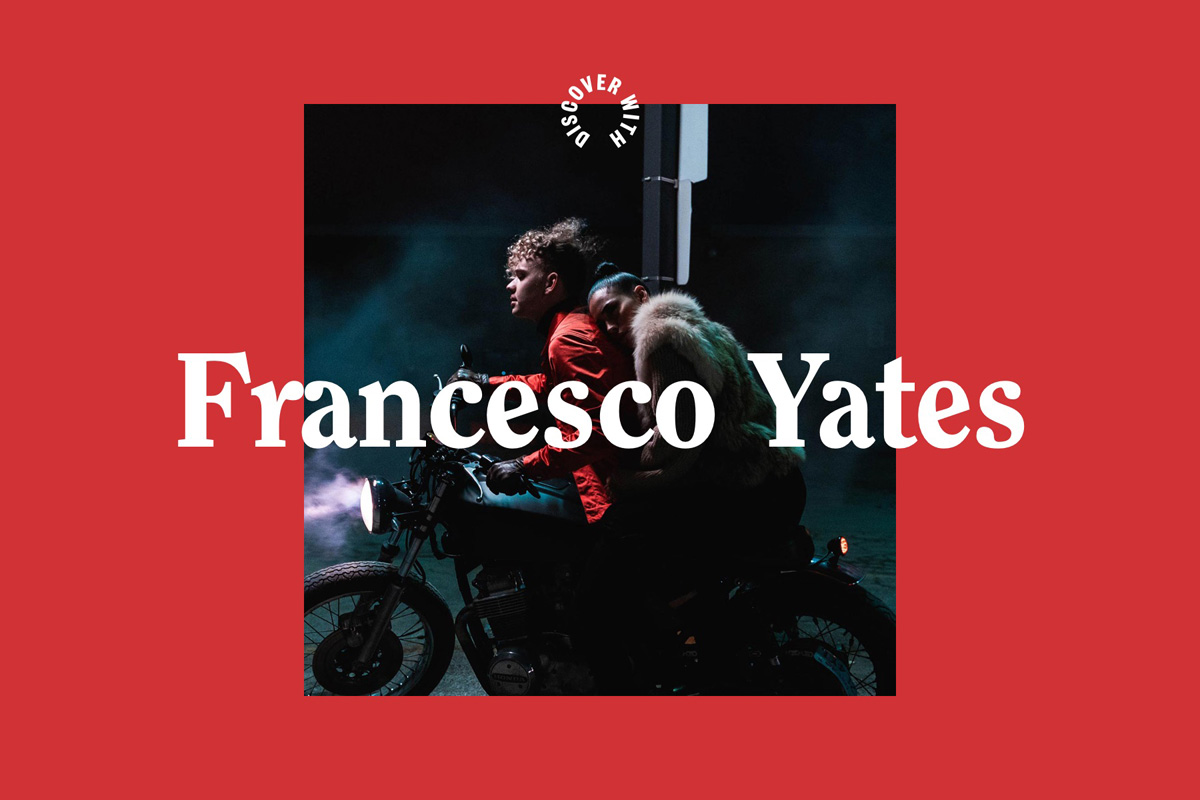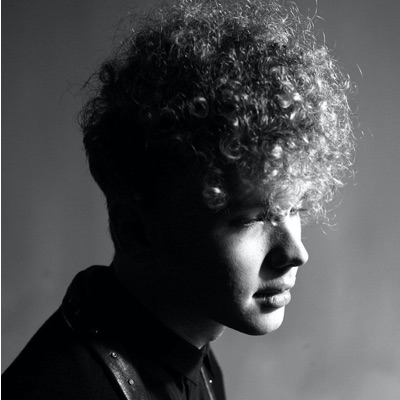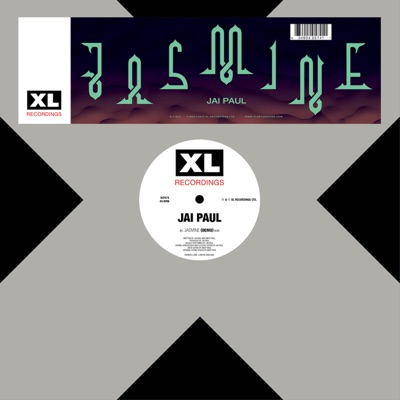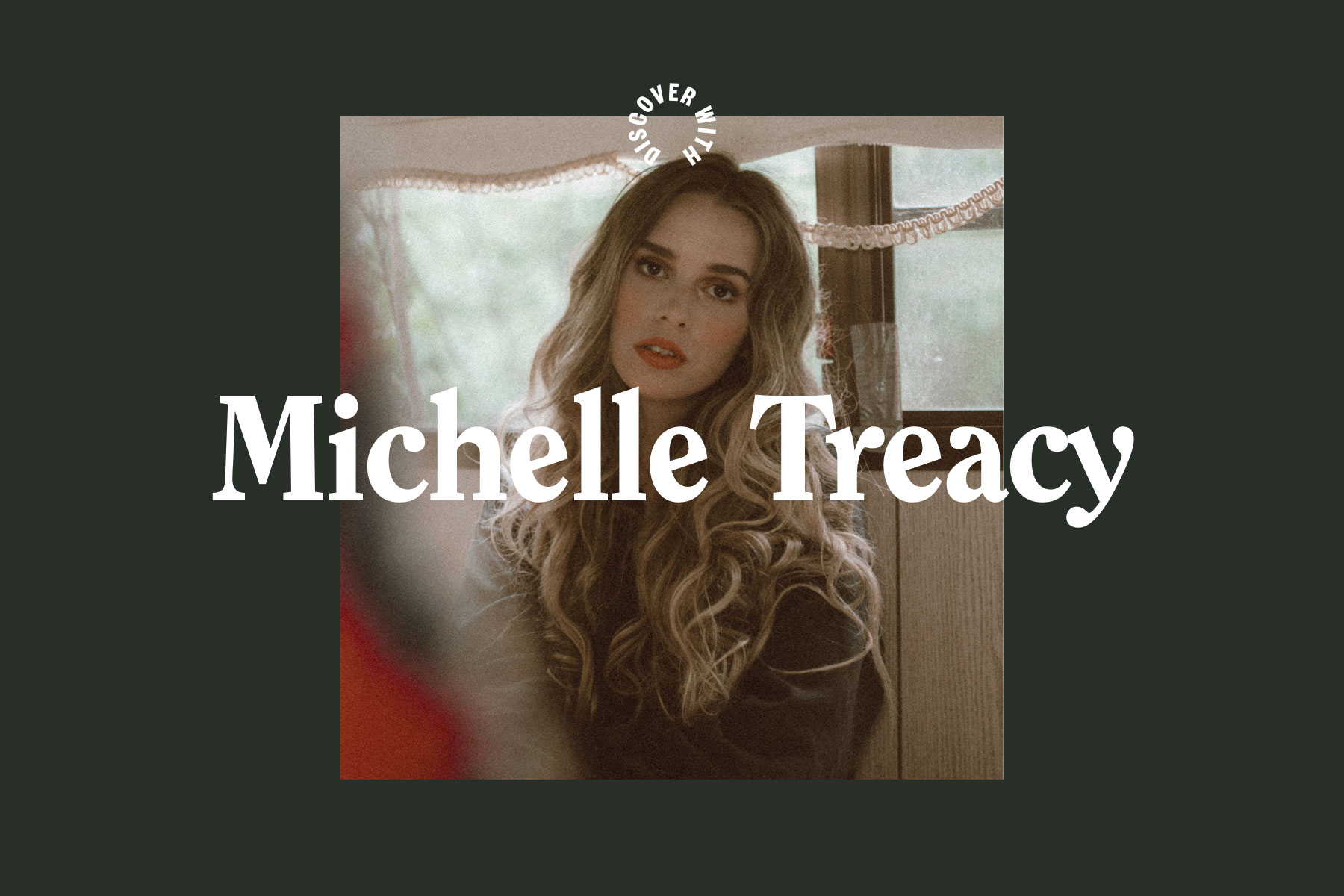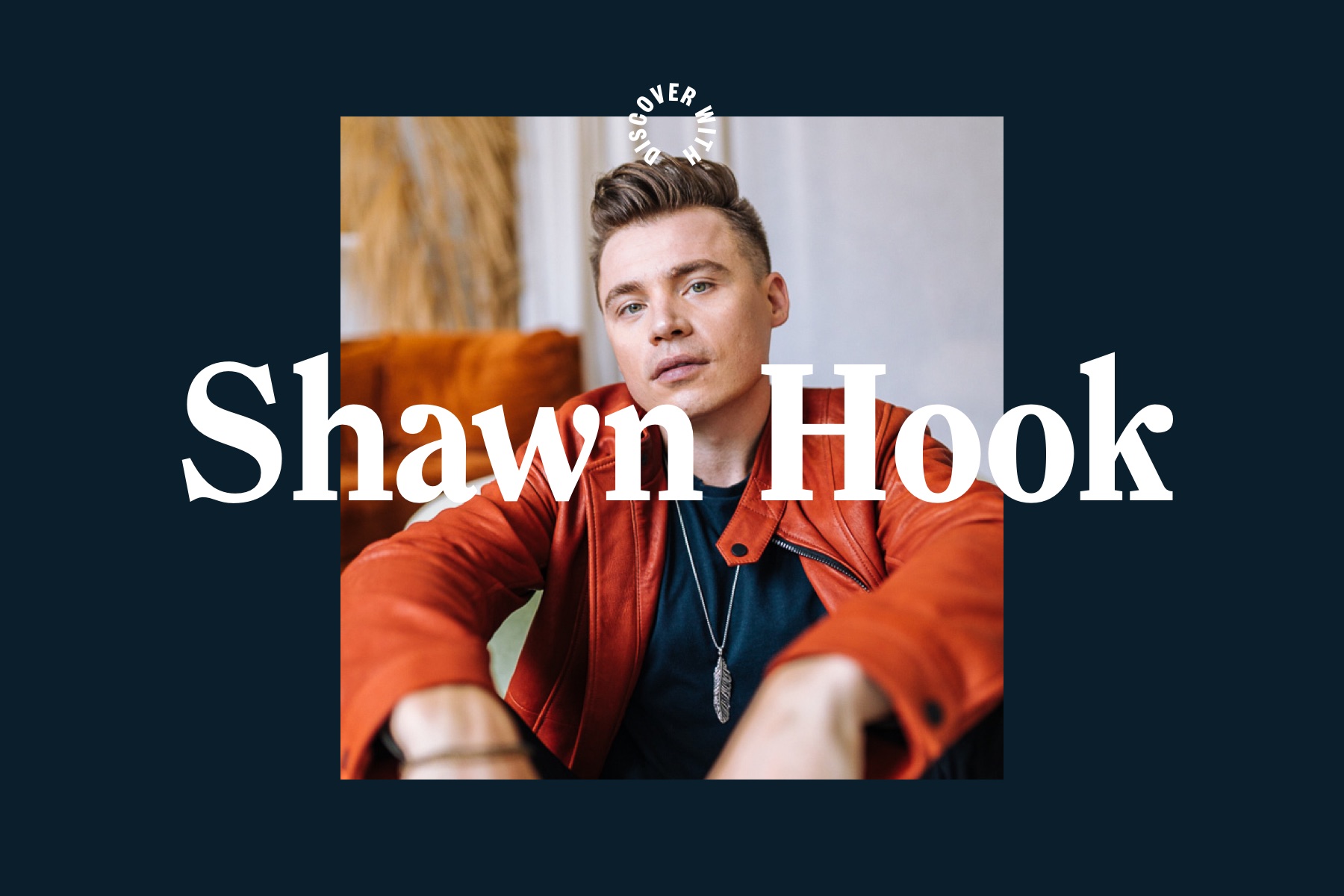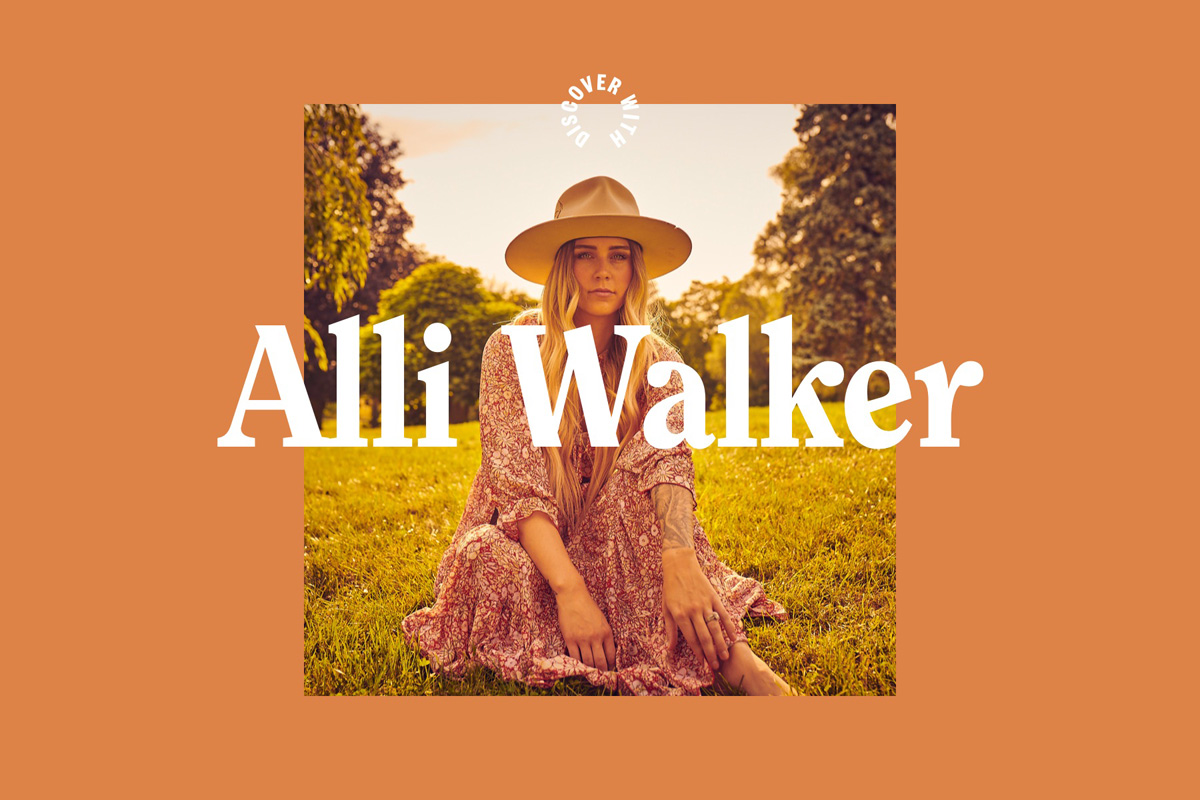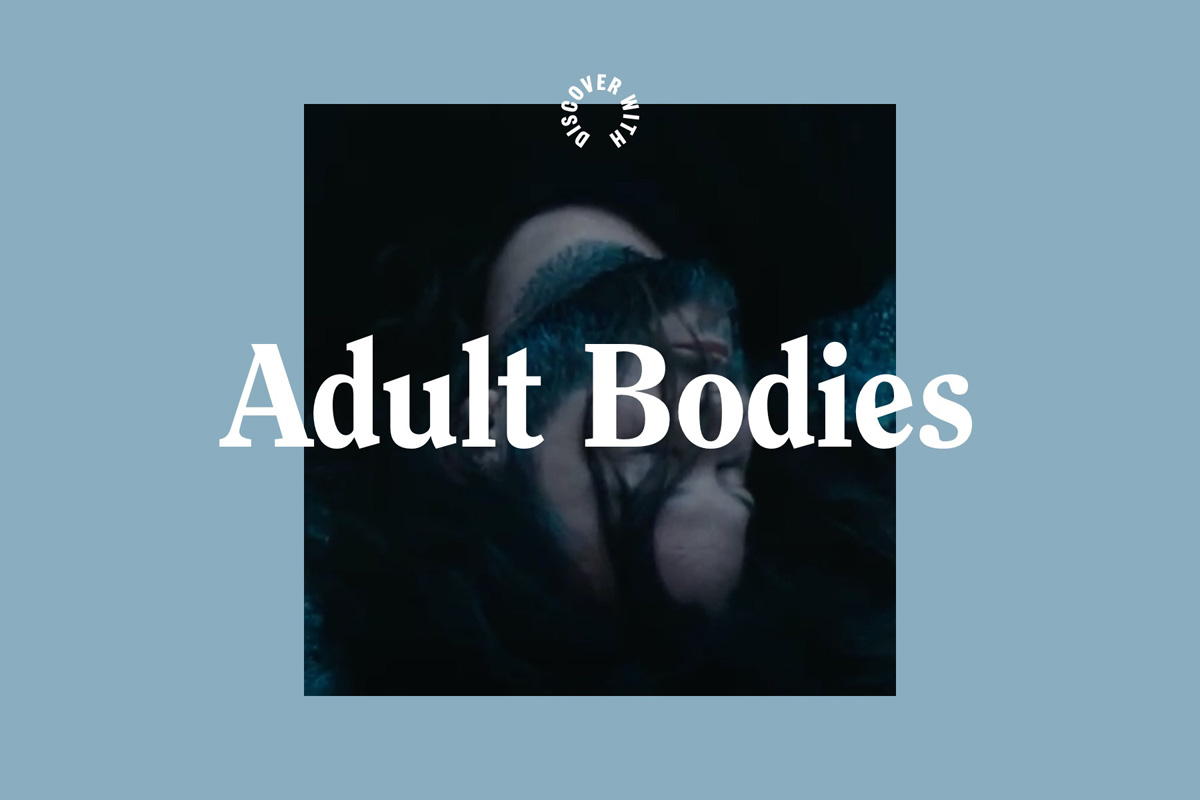Francesco Yates is a star. His self-titled debut EP was co-produced by Robin Hannibal and Pharrell Williams. His feature on Sugar by Robin Shultz went Certified Platinum. He toured with Justin Timberlake. And now, he’s independently writing, recording and producing his own music. So we asked him to put together a list of some tracks that are keeping him inspired.
What can we expect from this playlist?
I like a lot of R&B, so you’re going to see a lot of prominence of R&B in the playlist. You’ll see a lot of the deep vaporwave cuts too – I’ve been really into vaporwave for a long time and it seems like it’s getting its moment now in pop culture. But it’s mainly just stuff I’ve been listening to right now and what I’ve been gathering as inspiration for my own writing.
Definitely an ’80s vibe going on. How would you describe the specific sound aesthetic?
All of these songs paint a picture of nostalgia meets new, which is something that I have always have been about. I’ve never quite stepped into it the way I’m doing now, but I think this playlist is an example of a lot of that stuff. It can be eclectic, but it all still treads on the soul and the R&B meets the new type of production that we find ourselves in.
“All of these songs paint a picture of nostalgia meets new, which is something that I have always have been about.”
How does that reflect in your song writing?
The old school musicianship. I was watching a documentary, Everything Is A Remix. It basically goes into how everything is kind of a retread of the past but you have to find something to combine with it. So I think vaporwave is a perfect example of that type of genre where it takes something old which is reminiscent of the ’80s and kind of distorts the formula of it to make it something new.
Do we get a glimpse of that in your latest song Superbad?
Superbad has the disco, electronic flare going on. Which is approaching on the vaporwave thing, but it’s not quite there because I knew I had to strike a fine balance. Especially because a lot of the ’80s stuff is coming in. But Superbad is that older stuff meets the new. To make something modern, a lot of it has to do with what I’m singing about, and the drum patterns. All the other elements of a song can be ’80s, but if the drum patterns and the drum production is new, then it gives it that modern flare that it needs. I think songs like from Jai Paul are a better example of it than some of the vaporwave stuff in the playlist, because he’s able to do that stuff with the funky guitar, yet the drums and the effects are something we’ve never heard before. So that was kind of my goal in making Superbad and the songs on Superbad, which go a little bit deeper into those themes.
What kind of mood do these songs put you in?
Some of them get me dancing, some of them are these chill back R&B things, but they all have a very chilled out, chill wavy kind of mood. Especially this playlist that I put together, it’s very relaxing, very neon feeling. Like I couldn’t envision these songs being played in the daytime. It’s very night time-y music; you’re driving in the car in the after hours, stuff like that. Considering I’m a night owl, that goes very well.
Why are you up all night?
I make music at night. I do it that way because I know there’s nothing else that I could be doing during that time. When I’m up during the day, there’s a lot of business to put together. In order to get into a creative space, you gotta have nothing else going on around you. And during the late night is when I get that most.
This is the first vaporwave song I’ve ever heard. I remember first hearing it, there was something off and distorted about it that I liked. I couldn’t hear what the vocalist is saying, and maybe it’s that ambiguity that gives it a certain mystery. That’s what I really liked about it. Not only that, but it’s a fast vaporwave one. Which you don’t really see a lot of, so that made it unique to me.
It’s definitely fast, it’s only a bit over a minute long.
Yeah, I think it started that I–don’t–give–a–shit–about–structure thing. I think there’s something to be said about that, you know? They kind of made their own structure, and I think that’s pretty cool.
I first heard Jai Paul in Sweden when I was working with one of Max Martin’s guys who did Can’t Feel My Face. He played me this song. He said, “You gotta look into Jai Paul man, me and The Weeknd bonded over this.” And he said that’s kind of how they made the music for Beauty Behind The Madness. So I listened to it and I could totally see how that it’s that mid-tempo-y, slow, but with a driving bass line. And when I heard it I was like, “Mmhm, maybe I could use a change of palette.” It kind of forced me to go in a different direction with my music. Because that wasn’t really being done before that. I remember that one specifically. I was like, “Oh shit, this is a whole new vibe.”
Do you find that coming across new music sometimes makes you just rethink your whole thing, try new stuff and step outside your comfort zone? Or is there a lane you want to stay in that you’re content with?
You can have a lane you stay in but not for very long, because then you get stagnant. So for me, I always have to be listening to new stuff to get what the next sonic thing might be. And sometimes you also have to predict it too. That’s why I like listening to these obscure songs, because you can get ahead of it and see what’s really coming in the mainstream. It makes sense that he made Can’t Feel My Face after listening to it. Because the bass line palette, the way the drum works, it was so similar.
“That’s why I like listening to these obscure songs, because you can get ahead of it and see what’s really coming in the mainstream.”
I have a soft spot for the ’90s R&B, so this just fit right in. And the way they did it with the really, really sparse production, I was like, “Wow, these are the first guys to pull off that in a while.” Because for a minute, R&B was going in this very trap-inspired direction, and as soon as DVSN came about with this first one, I think it kind of opened people up to be like, “Okay, R&B like that, it can be cool again.” I was like, “Wow, how did these guys beat me to it?”
This is interesting to me because they’re actually going a bit faster with their tempo, which is something that they haven’t done a lot before. They’re kind of into the more slow things, so it was interesting to hear that from them. I remember listening to Majid Jordan around the same time my song Call came out, when they were kind of emerging. I remember one of the people on my team played it to them really early on and apparently when they heard it, they went back to the drawing board. So that was very trippy to hear. I could hear the shift of when that happened too.
The Time was one of Prince’s bands / R&B groups that he was developing. They were in the movie Purple Rain. The title is hilarious to me. All of these weird sexual titles, they’re so weird. But that one was good. The Groove is like 7 minutes or something, but you could just hear Prince’s production in the background. And that synth sound in the beginning of the song is so signature him. He kind of brought about the wave of all that synth-pop in the ’80s. It was almost done by him single handedly. But that one especially is where he really started to show off his keyboard chops. Which I vibe with too, because I’m a classically trained piano player. I just don’t really show that a lot, but for me to see all the movement, it’s like, “Wow, this guy, he’s something else.”
This is another vaporwave one that I really, really like. If you type in Vaporwave on Spotify, you’ll get this one playlist with this guy drinking Pepsi and all these amazing tracks come up, so I found this one on there. It was trippy because it’s vaporwave but it has this island sample in the background. That’s unique because normally they just draw upon the ’80s stuff. And I was like, “Oh, that’s interesting.”
This one I kind of just found all on my own. I was drawn to it because of how left the production was. There are a lot of glitches in it, which for vaporwave is common, but the way they did it was especially weird. And they still found a way for it to make sense. If you glitch a modern pop song and you repeat a word, you’re going to be like, “Wait a minute, that’s a skip in the record. That’s not supposed to happen.” But vaporwave’s really famous for doing that.
This is off the newest D’Angelo record, which I really love. I was on tour at the time, and I said to my band members, “I’m telling you, D’Angelo’s going to come back. He’s going to come back and he’s going to create another masterpiece again.” And my bass player didn’t believe me. But when he listened to it, he couldn’t believe what he was hearing. D’Angelo is one of those artists that he may not be in the pop music scene all the time, but when he drops music, it’s always consistent, and it’s always sonically exactly who he is. This one’s also really cool because it sounds like it could have been recorded in Paris, with all the string arrangements and everything. He’s a masterful musician. I heard a story where he learned how to play guitar fluently in a year, it’s pretty wild. I remember hearing D’Angelo for the first time when I was a little kid, my dad played him for me when I was 2 years old. So I got the straight R&B cuts from time, and D’Angelo is always going to be a prime influence for me. Especially because he does falsetto too.
Speaking of falsetto. Here is the king of falsetto, Prince, on this hilariously titled track, Soft and Wet. This was his very first single, and he produced it all by himself. Bause I do a lot of my production and a lot of my writing, it’s just crazy to know that. It sets the goal pretty lofty, but to me it’s just amazing. He’s one of the only guys I know in the major scene that’s able to get away with that.
To get that level of production quality and put that together all by yourself is probably a pretty tall order, isn’t it?
The thing is, I have laptops and technology to assist me. This guy was in a studio with the old gear and somehow was able to turn out the songs really, really fast. That stuff, there’s no getting around that. I was at Paisley Park when I was on tour. We went into Prince’s main studio where he recorded a lot of this stuff, and what was interesting to know is that he recorded everything sitting down so that he could engineer himself while he recorded. This guy put some shit together. This guy engineered his own stuff. It’s one thing to write a little bit, and it’s one thing to be doing the beats, but engineering your own stuff too? That’s an extremely tall order.
“He recorded everything sitting down so that he could engineer himself while he recorded.”
This is a song I just heard a couple days ago and I was just like, “Oh yeah, it’s got the ’80s vibe to it.” But his approach is really stripped down. And Com Truise was before vaporwave, so he was one of the forefathers. It’s cool to see that he’s still out there doing his thing. Hilarious name, too. The vaporwave people have the best names, you know?
For sure. And what’s more ’80s than Tom Cruise in Top Gun?
Of course.
You just released your new single Superbad last month. What can fans expect next?
We’ve got the Superbad EP in June and two more EPs for next year.
How has it been putting out music independently?
Since I’m independent, I think it’s great that you can create your own deadlines. And I think it’s cool that now more than ever, you can be an independent artist and it be realistic. Before, you’d be really compromising your success because you didn’t have distribution. But now with things like Distrokid, Awol, and all the distribution platforms, you don’t need to be signed to a label. You can be in your basement releasing songs and it can be all on the DSPs. So that is a huge game changer and I think a lot of people need to heed that. That mentality is going to expand with some of the artists now, because nobody wants to be told anymore as an artist how to make music.
With the access to these tools and having your own platforms on social media, what do you think it’s going to do to the true artist vs the manufactured talent?
I think what it’s going to do is split things down the middle. There’s going to be no more sitting on fences artistically. Either you are 100% committed to being part of the machine — and maybe that structure works for artists, where they need to be part of that regimented label machine — but it’s either you’re going to be that, or you’re going to be 100% your own niche thing that people just understand and follow.
Is there anyone that you’re super interested in knowing what they’d listen to?
I want to hear where The Weeknd is pulling these things from because he’s one of those guys in that class that doesn’t falter. I’ve never heard The Weeknd really falter or slip. And he’s reinventing himself every album, so you can imagine how hard that is to do to get people on board with that. Wherever him and his team are drawing from, their next moves are always where it should be. It’s amazing to me how they can predict these things, 2 years ahead of the game, you know?
